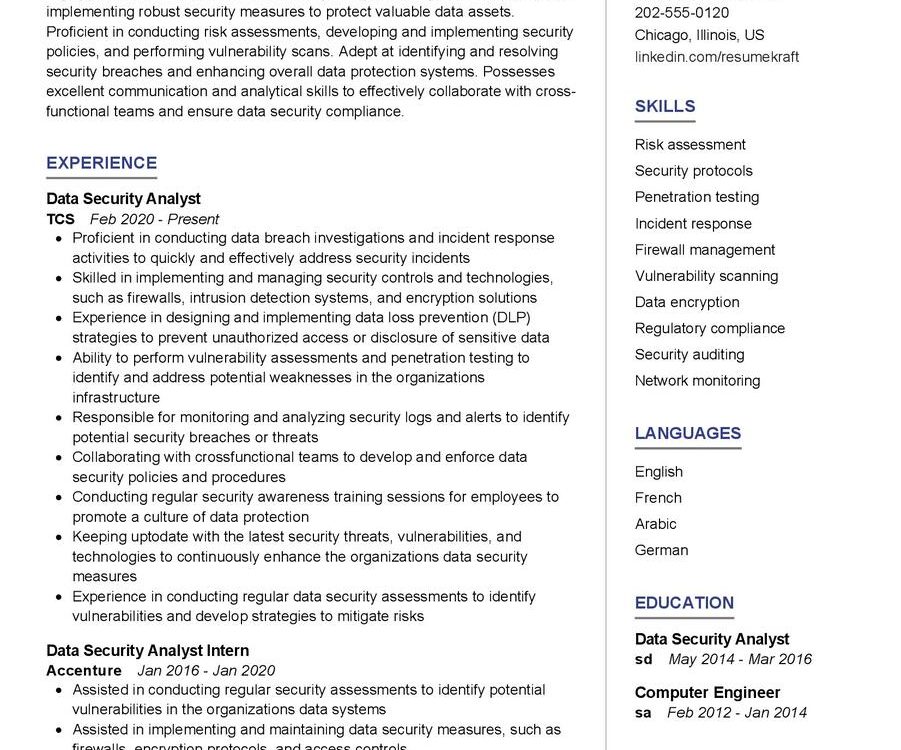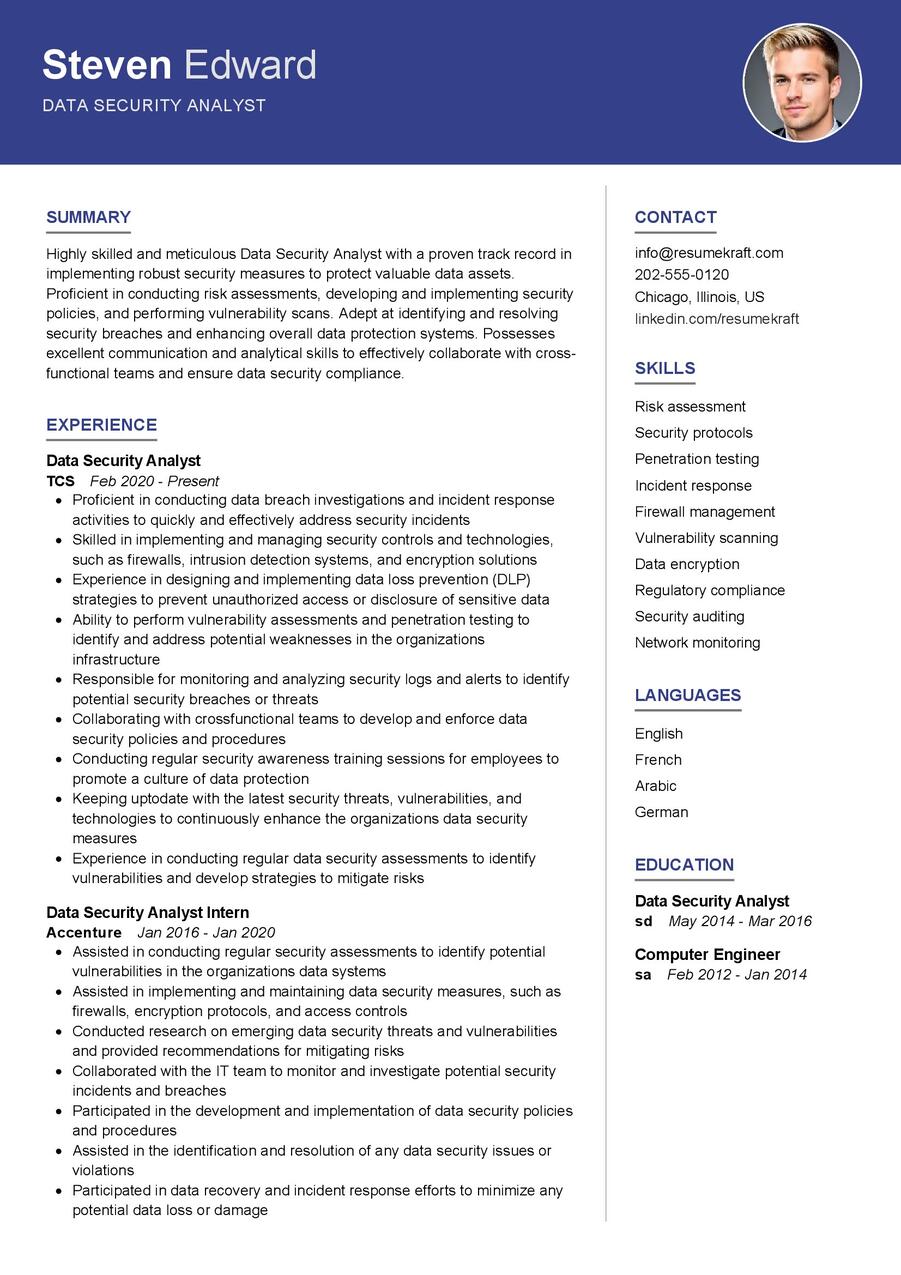Exploring the Role of a Data Security Analyst
In an era where data is a critical asset for businesses, the role of a Data Security Analyst has become indispensable. This position requires a unique blend of technical prowess and a vigilant eye for potential threats to safeguard sensitive information. Let’s delve into the multifaceted responsibilities and requirements of a Data Security Analyst, a key player in ensuring the integrity and confidentiality of organizational data.
What are the Job Requirements for a Data Security Analyst?
Embarking on a career as a Data Security Analyst demands a set of skills and qualifications that go beyond the surface. Here are the key prerequisites to excel in this role:
- A Bachelor’s or Master’s degree in Cybersecurity, Information Technology, or a related field, providing a strong foundation in the realm of data security.
- Thorough knowledge of cybersecurity frameworks, encryption protocols, and risk management strategies.
- Hands-on experience in implementing and managing security solutions, showcasing a trajectory of increasing responsibility.
- Proficiency in programming languages commonly used in cybersecurity, such as Python or Java.
- Excellent analytical skills, with the ability to assess complex systems and identify vulnerabilities.
- Up-to-date certifications in cybersecurity, such as Certified Information Systems Security Professional (CISSP) or Certified Ethical Hacker (CEH).
- Effective communication skills to convey security concerns and best practices to non-technical stakeholders.
Additional certifications, like Certified Information Security Manager (CISM) or Certified Information Systems Auditor (CISA), can significantly enhance your profile in the competitive cybersecurity landscape.
Responsibilities of a Data Security Analyst
The role of a Data Security Analyst is dynamic and plays a crucial role in an organization’s defense against cyber threats. Here are the primary responsibilities that define this role:
- Conducting regular risk assessments to identify and mitigate potential security threats.
- Implementing and managing security measures, such as firewalls, intrusion detection systems, and encryption protocols.
- Monitoring network traffic for suspicious activities and responding promptly to security incidents.
- Collaborating with IT and development teams to integrate security best practices into systems and applications.
- Developing and implementing security policies and procedures to ensure compliance with industry regulations.
- Providing training and awareness programs to educate employees about cybersecurity best practices.
- Staying abreast of the latest cybersecurity trends and emerging threats to proactively adapt security measures.
Each responsibility requires a meticulous approach, ensuring the organization’s data remains secure in the face of evolving cyber threats.
Data Security Analyst Resume Writing Tips
Crafting a compelling resume is essential to stand out in the competitive field of cybersecurity. Here are some tips to enhance your Data Security Analyst resume:
- Highlight specific instances where your security measures resulted in the prevention of potential threats.
- Detail any security projects you have led, emphasizing the impact they had on enhancing the organization’s cybersecurity posture.
- Quantify your achievements with metrics, showcasing the tangible improvements you brought to the organization’s data security.
- List relevant cybersecurity certifications prominently to demonstrate your commitment to professional development.
- Customize your resume for each application, aligning your skills and experiences with the specific job requirements.
Your resume is a reflection of your expertise and accomplishments, make it a compelling narrative of your journey as a Data Security Analyst.
Data Security Analyst Resume Summary Examples
Your resume summary serves as the gateway to your professional story. Here are some examples to inspire your Data Security Analyst resume summary:
- “Dedicated Data Security Analyst with over 8 years of experience, adept at implementing robust cybersecurity measures and leading incident response teams.”
- “Results-driven professional with a proven track record in conducting thorough risk assessments and implementing effective security solutions as a Data Security Analyst.”
- “Experienced Cybersecurity Specialist specializing in data protection and risk management, proficient in identifying and neutralizing security threats.”
Each summary encapsulates years of experience, expertise, and a commitment to ensuring the highest standards of data security.
Create a Strong Experience Section for Your Data Security Analyst Resume
Your experience section is the narrative of your cybersecurity journey. Here are examples to guide you in presenting your experiences as a Data Security Analyst:
- “Led a cross-functional team in implementing a comprehensive cybersecurity framework, reducing security incidents by 30% over the fiscal year.”
- “Managed the successful integration of advanced encryption protocols, enhancing data security and ensuring compliance with industry standards.”
- “Conducted thorough penetration testing, identifying and patching vulnerabilities before they could be exploited, contributing to a robust cybersecurity posture.”
Each experience is a testament to your skills and contributions in fortifying an organization’s data against potential threats.
Education Section for Your Data Security Analyst Resume
Your educational background is the bedrock of your cybersecurity knowledge. Here’s how you can present your educational milestones:
- Master of Science in Cybersecurity, XYZ University, 2016.
- Bachelor of Science in Information Technology, ABC University, 2014.
- Certified Information Systems Security Professional (CISSP), 2017.
Your educational qualifications showcase your commitment to continuous learning and staying at the forefront of cybersecurity practices.
Data Security Analyst Skills for Your Resume
Your skill set is your arsenal in the fight against cyber threats. Here are the essential skills that a Data Security Analyst should possess:
Soft Skills:
- Analytical thinking, the ability to assess complex security landscapes and devise effective solutions.
- Attention to detail, a meticulous approach to identifying and addressing potential vulnerabilities.
- Effective communication, conveying complex security concepts to both technical and non-technical stakeholders.
- Problem-solving, the capability to respond swiftly and effectively to security incidents.
- Team collaboration, working seamlessly with cross-functional teams to implement security measures.
Hard Skills:
- Proficiency in programming languages like Python or Java for cybersecurity applications.
- Knowledge of cybersecurity frameworks and compliance standards.
- Experience with security tools and technologies, such as intrusion detection systems and firewalls.
- Incident response and management, the ability to lead teams in responding to security incidents.
- Continuous monitoring and assessment of security protocols to adapt to evolving threats.
Each skill is a tool in your arsenal, essential for fortifying an organization’s data against cyber threats.
Common Mistakes to Avoid in Your Data Security Analyst Resume
Avoiding common pitfalls is crucial to crafting a resume that stands out. Here are mistakes to steer clear of:
- Generic resumes that do not highlight your unique fit for the Data Security Analyst role.
- Focusing solely on job duties without showcasing the impact of your security measures and initiatives.
- Neglecting to include a cover letter, missing an opportunity to personalize your application and convey your passion for data security.
- Overloading your resume with technical jargon that may obscure your achievements and contributions.
- Failing to proofread, potentially leaving errors that can impact your professional image.
Avoiding these mistakes ensures your resume is a compelling and authentic representation of your capabilities as a Data Security Analyst.
Key Takeaways for Your Data Security Analyst Resume
As we conclude this comprehensive guide, let’s recap the key points to keep in mind while crafting your Data Security Analyst resume:
- Highlight your hands-on experience in implementing security measures and managing cybersecurity projects.
- Emphasize your analytical skills in assessing and mitigating potential security risks.
- Showcase your commitment to continuous learning through relevant certifications and professional development.
- Customize your resume for each application, aligning your skills and experiences with the specific requirements of the position.
Remember, your resume is not just a document; it is a testament to your dedication to ensuring the highest standards of data security. Best of luck in your endeavors as a Data Security Analyst!
Finally, feel free to utilize resources like AI Resume Builder, Resume Design, Resume Samples, Resume Examples, Resume Skills, Resume Help, Resume Synonyms, and Job Responsibilities to create a standout application and prepare for the Data Security Analyst job interview.


